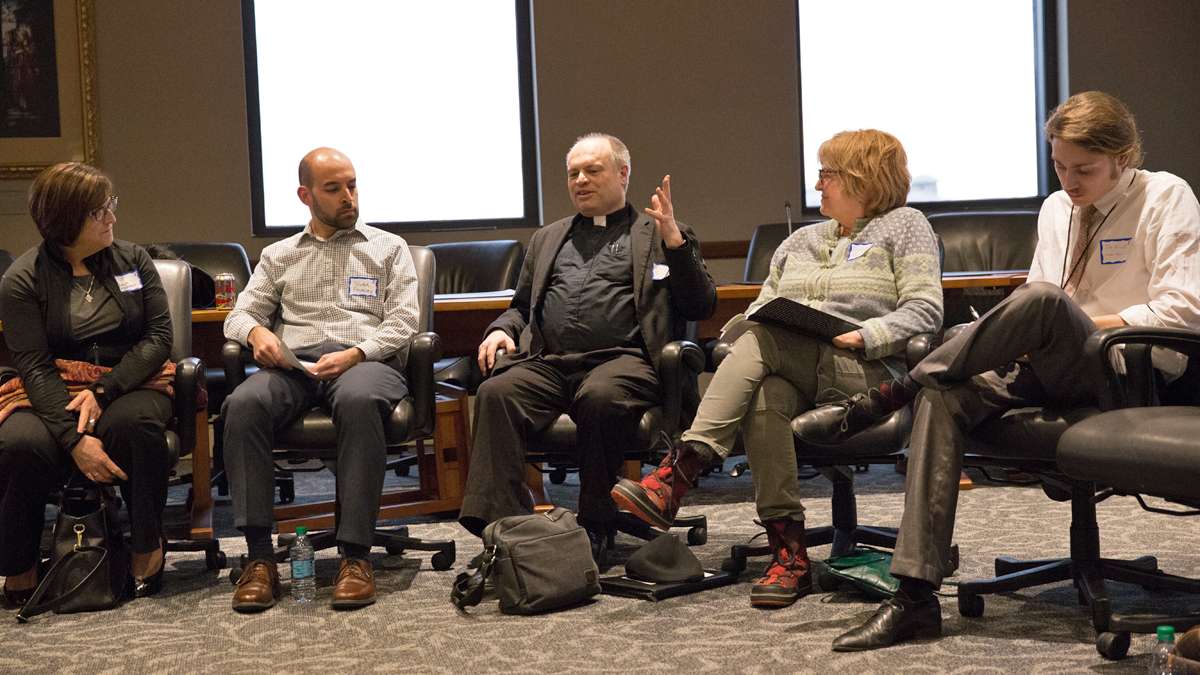In case you missed it: This week’s best reads from Pennsylvania cities

Fr. Michael Bellofiore II introduces himself and discusses his hopes and fears for Scranton, at the Keystone Crossroads forum. (Lindsay Lazarski/WHYY)
Basketball, marijuana and other urban issues.
Nova wins (and other Philly news)
Before March Madness, there was some debate about whether or not Villanova qualified as a Philadelphia university. But now, after that beautiful buzzer-beater of a win, the city “starved for winners” is getting on board. Philadelphia is holding a parade today for the Wildcats, but in case you can’t make it down to the action, we’ll dedicate the first part of ICYMI to the city near the school.
Villanova’s defense having been on fire is something to celebrate, but the city’s Fire Commissioner is celebrating the opposite: Philadelphia fire deaths hit an all-time low last year, thanks to targeted efforts by the city and the American Red Cross. The Red Cross offered free fire inspections and installed smoke detectors with 10-year batteries. Benjamin Franklin, creator of the first fire department in this country, would be very proud.
Philadelphia is working to get low-income families the Earned Income Tax Credit they deserve. City Councilman Alan Domb said, “Last year, we left $100 million on the table that could have gone to 40,000 families who could get checks from $2,000 to $6,000.”
And the finally-sorted state budget is turning out to be a slam dunk for Philadelphia schools. The city schools will get a $76.8 million boost to their funding as Governor Wolf begins to distribute education dollars. When Wolf signed the budget, he vetoed the fiscal code, which outlines how to spend the money. Republicans in the legislature aren’t happy with the way he’s unilaterally distributing funding, but Wolf isn’t happy that (even with this boost) Philly schools will still only have 87 percent of the funding they used to receive.
All the news that’s fit to explain
Local and state government can be difficult to understand. And Pennsylvania’s idiosyncrasies don’t make it any easier. Take the term “city.” Seems pretty straightforward, right? But Pennsylvania has a very specific definition of the word, and some qualifications to go along with it: there are different classes of cities, and somehow, Scranton has a separate system from anyone else. And what the heck is a township?
Don’t worry. We’ve got you covered with an explainer that breaks all that down. And we’ve got a lot of other explainers on a whole range of subjects, from lead to pay-to-play. If we find ourselves surreptitiously googling a term, you can be sure we’ll make an explainer out of it.
We also cover a lot of really complex topics, like pension reform. We try to work in some explanations as we go, like in our recent article about the Pennsylvania Employee Retirement Commission possible take-over by the Independent Fiscal Office. Confused yet? The story has enough definitions and explanations, you’ll be knowledgeably discussing the pension crisis by dinnertime.
Keystoned State
Is Pennsylvania going to be the next state to legalize marijuana, joining the ranks of Colorado and Washington? No. But legislators are working on a way to legalize medical marijuana, used to treat seizures, chronic pain and mental health issues like PTSD. The bill has been held up by some politicking but advocates are hopeful.
Cities are a little more active than the state. In October 2014, Philadelphia decriminalized the possession of small amounts of marijuana. In December, Pittsburgh City Council followed suit. Anyone caught with 30 grams or less is fined, rather than charged with a misdemeanor criminal offense. People can still be charged or arrested if they’re caught buying the drug, driving under the influence or committing another crime while in possession.
State College is considering a similar move, inspired by a student who spoke to the borough council in March. He explained that a criminal charge can result in the loss of student financial aid. Council is proposing that marijuana charges result in a fine, similar to an open-container violation.
The city of Wilkes-Barre is taking baby steps on the issue by decriminalizing the posession of drug paraphenalia, like pipes or syringes. This move comes not from a sympathy for drug users, but rather as an attempt to earn some money for the city. The $300 fine for a summary offense is expected to be more lucrative for the city than the current model, which requires the charging officer to attend court proceedings. Fines for misdemeanors and felonies go to the state; fines for summary offenses go to the city.
A night (or day) with Keystone Crossroads
On Wednesday night, residents, community leaders and students from Scranton gathered to talk about their community. In Keystone Crossroads’ seventh community forum in the state, Scrantonians told us their hopes and fears for the Electric City. The conversation was wide-ranging: the city’s finances, the education system, environmental concerns and economic development.
Keystone Crossroads has held these forums in other cities as well. We’ve been to Reading, Altoona, Philadelphia, Pittsburgh, Bethlehem and Harrisburg, and learned a lot along the way about how Pennsylvanians view their city and state. If there is something you think Keystone Crossroads could be doing a better job covering, or something you’d like us to know about your city, you don’t have to wait for a forum to come to town. Email us at keystone@whyy.org.
And if you’re feeling particularly jazzed about the urban issues facing Scranton and countless other cities in the commonwealth, join us for a conference on May 10th! We’ve gathered experts, urbanists and local government leaders from around the state to talk about preservation, regionalization, resiliency and many other important topics. Plus, Governor Wolf will be giving the keynote address.
WHYY is your source for fact-based, in-depth journalism and information. As a nonprofit organization, we rely on financial support from readers like you. Please give today.


